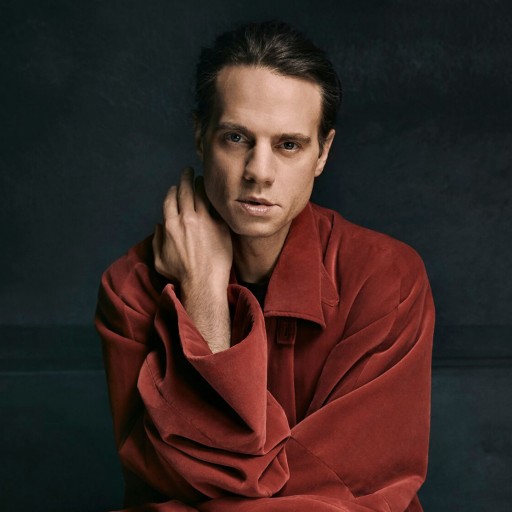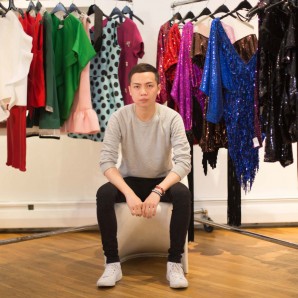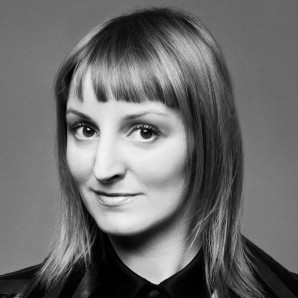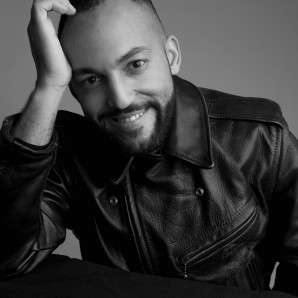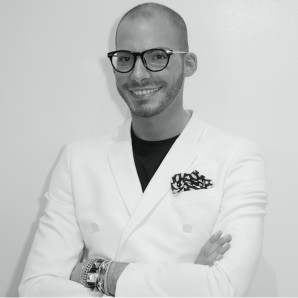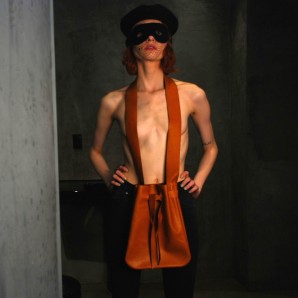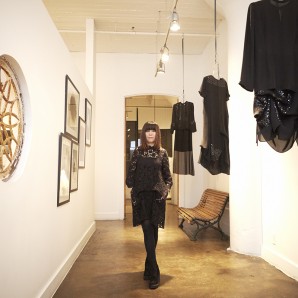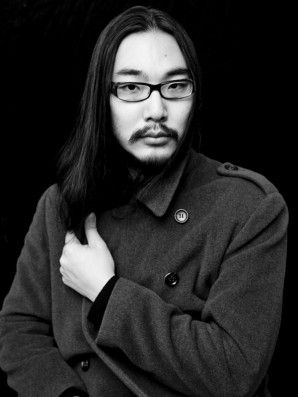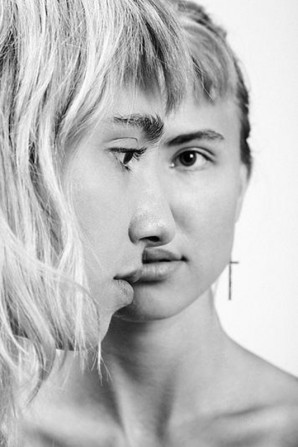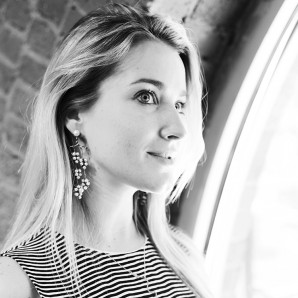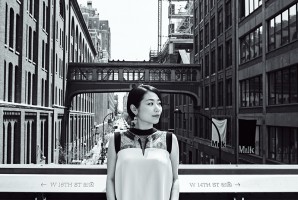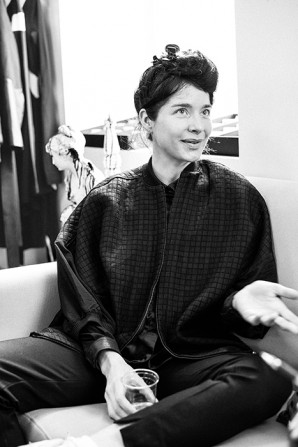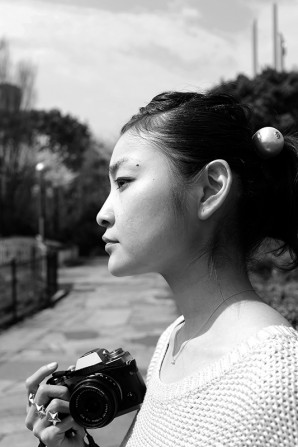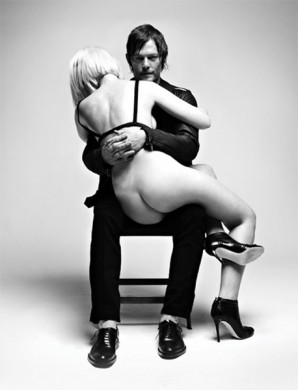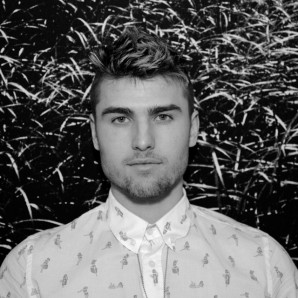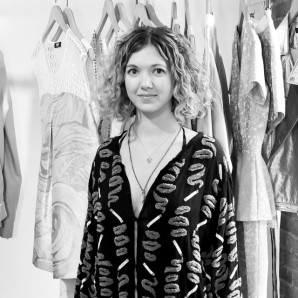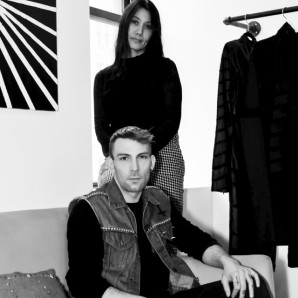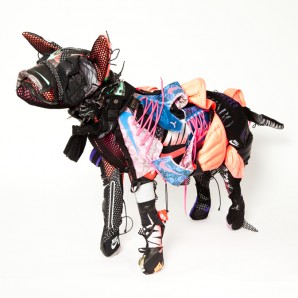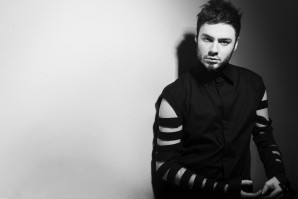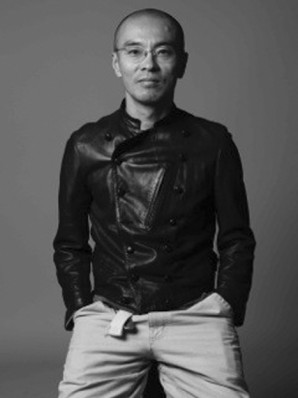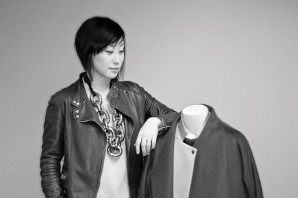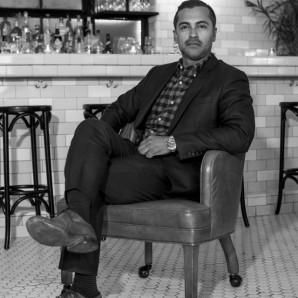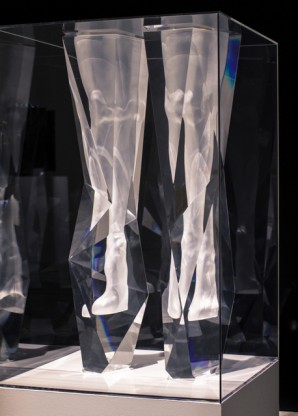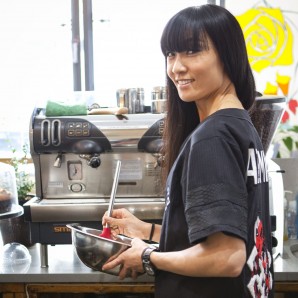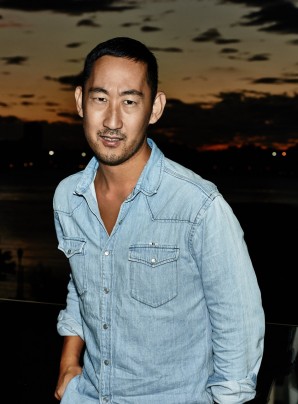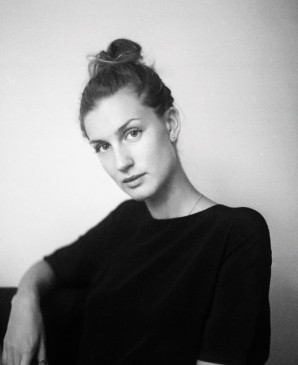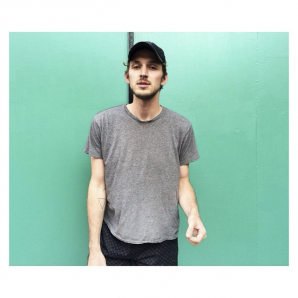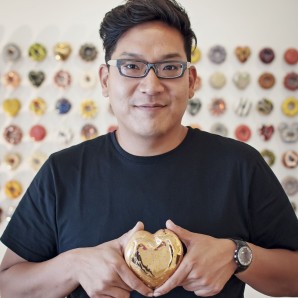"Cheng-Huai Chuang was introduced to fashion at a young age"
INTERVIEW: Bigwig Broadway Producer, Jordan Roth and Acclaimed Choreographer, Michelle Dorrance
A soul talk between the bigwig Broadway producer, Jordan Roth and the acclaimed choreographer Michelle Dorrance about the nature of kindness and how dance fixes the soul.
-------------JORDAN ROTH & MICHELLE DORRANCE-------------
Michelle: I'd imagine everyone thinks they're right, I would assume so. I guess we hope that --
Jordan: I do think everybody thinks they're right.
Michelle: I think that there's fear-driven right and there's hope-driven right. And I think the fear-driven right folks should open their minds a little more and wonder why they're so scared. Because usually you're scared of the other or someone is scared of an immigrant taking their job and often people are scared of things that are intangible.
Jordan: Aren't we all scared?
Michelle: Yeah. We're all scared to an extent. What I'm most scared of is masses of people being killed, compromised, jailed -- like those fears and the fact that we could see some totalitarian or really nasty possibilities ahead of us. It's also smart to acknowledge, I don't think we need to act out of fear, we should act out of what we can do to make this better. Yeah, I think we're all scared to some extent.
Jordan: I think a lot about doubt because I have a lot of doubt.
Michelle: How so?
Jordan: Just in that I -- the level to which somebody believes they are right is the inverse of the amount of doubt that they allow to creep into their heads.
Michelle: Could it be open-mindedness? Like can someone believe they're right, but still --
Jordan: Yes, that's probably a better spin than doubt. Yeah. But allowing for the possibility that you may not be right.
Michelle: Right.
Jordan: I guess that sort of doubt is the opposite of zeal, perhaps.
Michelle: Yeah.
Jordan: And, this is what I believe, this is what I know, but maybe there's more, maybe there's something I'm not seeing -- When that doesn't exist, that's when I get really scared.
Jordan: That's what scares me the most.
Michelle: The inability to reflect I think is, that's the end. I can 100 percent know how my heart feels so there's a true confidence in my passions and my feelings. I don't ever doubt what I'm feeling. But how I came to feel it is rooted in subconscious judgments, is rooted in my experience as a human being. And if we don't reflect on that like, I know why that angered me and it's because this used to happen to me when I was little -- You know what I mean? -- If we don't have a moment to go take a deep breath and know that you're being more sensitive than you usually would be -- this particular poke hits a little deeper because there's a bruise in there from an old poke or whatever it is -- If we don't take a look at that --
Jordan: Is that what you're doing in your work?
Michelle: Oh man. I don't know. There might be some elements of that inside larger pieces of work. That's interesting. Well, just exploring, reflecting. And one work in particular that I made most recently, I absolutely had to exorcise someone who was very manipulative – someone who was in my life very intimately, very quickly, and the havoc that was wreaked because of it, and because I made certain decisions in relation to it or was manipulated into. But I have to take responsibility and say you are a sucker so that's why you got --
Jordan: “You,” me?
Michelle: Me. Me looking at myself. You, Michelle Dorrance, are a sucker. You are so bent on care-taking that you couldn't see that that was the way you were pulled into this by someone who saw that in you -- they played the victim because they knew you would go for it. That's embarrassing. And also, the idea that practiced behavior becomes method, it becomes who you are. You can choose the wrong thing enough times for it to be your go-to even though you know it's wrong, and I observe that in this person.
Jordan: Okay, well, that has to take us to dance. Practiced behavior becomes who you are.
Michelle: Absolutely. Well, that's the other part of it. That's also how we become as proficient as possible. Masterful technicians. It's the only way.
Jordan: Repetition.
Michelle: Exactly. The piece is called Myelination, it's about the fatty tissue that builds around synapse fires in your brain -- all the nerve fibers. That's how we remember things. That's how we do anything we do -- that's how we walk. Everyone used to think that gray matter was the most important thing when really we're still learning, discovering elements of what's really happening in our brains. But this, it's insulating myelin, myelin is this fatty tissue and it's the white matter in the brain. It's insulating these pathways so that the more you do it, the more that builds around it and the faster it fires. So things that we don't have to think about — walking, talking, you know — we've practiced and it exists. But things we're learning how to do for the first time or innovating within something we've done before -- when I'm used to doing a shuffle heel and I want to do some weird toe stand before I do the heel, all these other things have to happen in order for, first of all, the heel not to engage first and then also for me to get off the ground and do this other thing before I land again. So just that idea, that's going to take some practice for it to build. That relationship has everything to do with building skill, building technical mastery, building the ability to make music, building the ability to communicate. All of those things intersect with the same practice that treats people with kindness or hatred.
Jordan: This is going to make me cry and I feel like this is a breakthrough.
Michelle: You know what I mean though?
Jordan: That's the book.
Michelle: That's the book, oh my gosh. You know what I'm saying.
Jordan: I do. I mean, whole world of business thinking, self-help thinking is around habit and how you build habit. So I think you're pointing us to a whole legacy of creation and work and creativity that is doing exactly that and telling us, pointing us in that direction, with that kind of repetition. Put this in your body so it lives in your body.
Michelle: And it must. It has to be embodied. Kindness is embodied, it's practice.
Jordan: Kindness is embodied, it's practice.
Michelle: But it is also from this other -- and I believe this and whether you want to call it spiritual or hippie or whatever -- I am a person who believes in the way our spirit engages and interacts in our physical being. And whether people want to quantify that as energy or something scientific, there are a lot of other ways we can think of it, that we are invested on this other plane in our physical body and that practice, that's what takes it to a level that changes hearts and changes spirit and can change. There can be someone who's practiced in another way that can change, that can be moved by something. When it reaches to the core of something and can change it from the inside. It's not that we can't pray for revolution for people who have been practicing hate, I think we can. But it means really getting to the heart of something.
Jordan: But I also think that it takes us to -- we've been talking in extremes.
Michelle: Yes, of course.
Jordan: And probably more useful or just as useful is all of those little things that are inside all of us that don't serve us individually and that don't serve us communally. Maybe if I could find my way out of that through the repetition of my body in the way that you would prepare your body to dance or prepare your dancers to move --
Michelle: Or perform.
Jordan: For you.
Michelle: To execute something that takes the kind of strength that you can only build through repetition, it's the same thing you're talking about. All those little decisions that you have to make on a given day, even if it's your own thinking. Like, I won't engage this negative thought because I know what it will do to me. I'll continue to do this and then I'll have this big part of me that does that. It's every little choice. Then you're building a muscle that's more resilient to indulging that pathway.
Jordan: Dance as a metaphor for fixing the soul.
Michelle: Because it does.
Jordan: Not metaphor. Instruction manual.
Michelle: It is. It's nuts.
related posts
NEW TYPE #12: DROMe - MARIANNA ROSATI INTERVIEW
" I carry in my heart the values I've learned from my hometown - such as being true to myself and to my style"
IKEMEN #30: JORGE URENA
IKEMEN (ē´k´mɛn): Japanese Slang
"REALLY, REALLY, RIDICULOUSLY GOOD LOOKING PEOPLE"
NEW TYPE #11: LODOVICO ZORDANAZZO INTERVIEW
TWELV Magazine sat down with Lodovico Zordanazzo during his NYC visit to discuss his new collection and unique perspective on shoe design.
NEW TYPE #9: J.ELSTER - JENNIFER ELSTER Interview
TWELV Magazine recently visited filmmaker and designer, Jennifer Elster, at her studio, The Development.
NEW TYPE #8: MORGANE LE FAY - Liliana Casabal Interview
Noritaka Tatehana Exclusive Interview
The talented young Japanese designer, Noritaka Tatehana, who collaborated with Iris Van Herpen to design Lady Gaga’s shoes.
CHAOS CHAOS Interview
Formerly known as Smoosh, Asy and Chloe Saavedra of Chaos Chaos have always been a sister-sister duo.
THE KNOCKS Takes Tokyo
Recently, electro-pop duo, The Knocks, visited Japan to perform in the ARC+TWELV party at ARC, a newly opened venue in Tokyo.
CAVERNS Interview
TWELV had privilage of chatting with our friends from the band Caverns. The trio hail from NYC and are pretty much all over the music scene here!
Michael Phillips Moskowitz, eBay Chief Curator & Ed. Director, Interview
TWELV Magazine had the pleasure of connecting with Michael Phillips Moskowitz, the Global Chief Curator & Editorial Director at eBay.
NEW TYPE #7: EKAT - Katya INTERVIEW
"Introducing a new generation of designers"
Mai Mukaida Interview
Makeup Artist / CEO, Lalitpur.
Believes in the power of cosmetic
and lives with women in Nepal.
M KOUGER INTERVIEW: Farmhouse
With the fabulous Chloe 81, the oysterrific Chloe 81 Blue Room and the recently opened Farmhouse Restaurant, M Kouger has established an essential trifecta of entertainment in NYC’...
NEW TYPE #6: BERENIK- Veronica Brusa INTERVIEW
"Introducing a new generation of designers"
REI SHITO INTERVIEW
Street Fashion Photographer
and Style Blogger.
Loves in Street and the Beyond
Interview: The Refined Opulence of Hoorsenbuhs
The Hoorsenbuhs name has become synonymous with exclusivity, craftsmanship, and opulence. Once nothing more than the ambitious brainchild of creator Robert Keith, the brand has become a staple in...
NEW TYPE #5: HAZE Collection INTERVIEW
"Introducing a new generation of designers"
IKEMEN #29: JAY XERO
IKEMEN (ē´k´mɛn): Japanese Slang
"REALLY, REALLY, RIDICULOUSLY GOOD LOOKING PEOPLE"
Travis Bass Interview
New York’s Greenwich Village is now home to a new and amazing club created by the ultimate party planner/Pop Up Club designer, Travis Bass, called ZAZOU.
NEW TYPE #4: SAUNDER - Emily Saunders interview
"Introducing a new generation of designers"
NEW TYPE #3: GLORIA YU interview
"Introducing a new generation of designers"
IKEMEN #28: CJ Swanton & Mariko Derpa
IKEMEN (ē´k´mɛn): Japanese Slang
"REALLY, REALLY, RIDICULOUSLY GOOD LOOKING PEOPLE"
NEW TYPE #2: VINTI ANDREWS - Vinti Tan and Paul Andrews INTERVIEW
"Introducing a new generation of designers"
NEW TYPE #1: DEJAN DESPOTOVIC INTERVIEW
"Introducing a new generation of designers"
BEHIND THE SCENES #3: KATSUYA KAMO
TWELV's Behind the Scenes takes a step back and visits the masterminds behind the camera.
SUK CHAI INTERVIEW "SCHAI"
“My hands and eyes ooze desire to create when I touch something special. When I touch the “right” fabric, I usually close my eyes and visualize all the things I can create.”
IKEMEN #27: M KOUGER
IKEMEN (ē´k´mɛn): Japanese Slang
"REALLY, REALLY, RIDICULOUSLY GOOD LOOKING PEOPLE"
NORITAKA TATEHANA EXCLUSIVE INTERVIEW
NORITAKA TATEHANA EXCLUSIVE INTERVIEW
IKEMEN #26: KANAMI KAWAGUCHI
IKEMEN (ē´k´mɛn): Japanese Slang
"REALLY, REALLY, RIDICULOUSLY GOOD LOOKING PEOPLE"
MAISON KITSUNé INTERVIEW
During their first ever showing in New York Fashion Week, TWELV Magazine and I got to catch up with the talented duo behind the remarkable brand, MAISON KITSUNÉ, We spoke with Gildas Loaëc and...
MARIA HEDMARK INTERVIEW
Although Swedish transplant MARIA HEDMARK has only been in New York City for three years, her line, LINIE NYC, takes its name straight from the city that never sleeps.
IKEMEN #25: LANDON MILLER
IKEMEN (ē´k´mɛn): Japanese Slang
"REALLY, REALLY, RIDICULOUSLY GOOD LOOKING PEOPLE"

